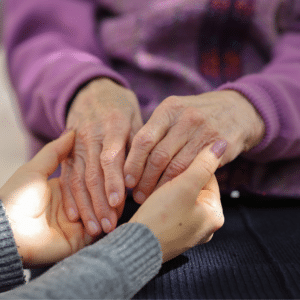Redefining Self-Care for Dementia Caregivers

Over 11 million people in the United States provide unpaid caregiving for a loved one with dementia. Despite this huge (and growing) number, we lack a solid infrastructure of support and training for dementia caregivers.
Our health care system and our society seemingly operate on an assumption that this work is intuitive. Many families getting a new dementia diagnosis get the “diagnose and adios” treatment. They may be sent away with a pamphlet about the type of dementia involved or they may be sent away empty-handed, left to make their way on internet searches and instinct.
be sent away empty-handed, left to make their way on internet searches and instinct.
Caregiving is physically and emotionally draining work. For many, working hours are 24/7. And breaks are few and far between.
When days are filled with seemingly random behaviors that can range from heartbreaking to infuriating to frightening, the situation can feel out of control. Burnout can’t be far behind.
Problem of Self-Care for a Caregiver
Another infuriating experience often comes from well-meaning friends and acquaintances trying to offer support by urging the caregiver to “take care of themselves.” With everything on a caregiver’s plate, this can seem an impossible task. Lying on a beach with a book is so far outside their experience that it may seem like any form of self-care is out of reach.
Yet the fact that caregivers need regular stress release to continue caring for their loved one is undeniable. They may live much of their lives in a state of fight-or-flight. With every question asked the fiftieth time today, every emotional explosion based on a delusional thought, every devastating incremental loss of the person they knew, the caregiver’s body moves further into the stress response.
The stress response results in a racing heart, faster breathing, higher blood pressure, poor digestion, tense muscles, and fuzzy thinking, as the body redirects blood flow to the extremities, preparing to run or battle. When this becomes a chronic state, the caregiver’s body and mind fatigue, making them more prone to illness, depression, and injury.
The good news is that the body has an antidote to the stress response: the relaxation response. When we enter this state, muscles relax, circulation increases in the brain and digestive system, and stress hormone levels in the bloodstream drop. The body repairs and restores itself in this state, which fuels our resilience.
Need to Personalize Self-Care
Self-care is not one-size-fits-all. Each of the 11 million dementia caregivers may have a different strategy that jogs them out of fight-or-flight and triggers the relaxation response.
As an occupational therapist and coach who supports dementia caregivers, I’ve heard a wide variety of self-care strategies from my clients.
- Film studies classes
- Late-night baking
- Early morning rowing
- Hiking
- Boxing
- Reading for a book group
- Getting nails done
- Shopping
- Time with pets
- Time with grandkids
- Bridge night
- Going for a drive and screaming in the car
- Listening to relaxing music
- Dancing to raucous music
It may take some extra effort to make these things happen, but once you find your own recipe for relaxation, it’s worth it.
Stress and Crisis Care Needs
While these types of release are preventive in nature, sometimes stress builds to a crisis level. When faced with the difficult behaviors that dementia can bring, the following strategies can turn down the volume on stress.
- Diaphragmatic breathing
- Progressive muscle relaxation (tense and release)
- Chanting a mantra
- Tapping therapy
- Listening to music (soft OR loud)
- Stretching
- Visualizing a “safe place”
- Thinking of someone whose presence calms you
Find your own ways to defuse stress in the heat of the moment and over the long term to prevent it from ruling your life. You’ve worked hard to build a system of care for your loved one. It doesn’t work without you.
Contributed by:
 Emily S. Gavin, MS, OTR/L, CDP is a dementia care expert, occupational therapist, and coach, supporting dementia caregivers in the Philadelphia area.
Emily S. Gavin, MS, OTR/L, CDP is a dementia care expert, occupational therapist, and coach, supporting dementia caregivers in the Philadelphia area.
In her private practice, she helps clients understand how their loved ones perceive the world, decreasing the stress and strain in caregiving relationships. She is also available for public speaking engagements. Learn more at www.phillycarecoaching.com, PhillyCare Coaching on Facebook, phillycarecoaching on Instagram, and Emily S. Gavin on LinkedIn.
Leave a Comment
